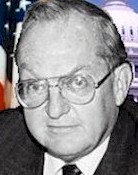| News from July 16-20, 2002 |
 Rep. Goodlatte stated that "I did
not want to miss the opportunity to ask if there weren't some accommodation that
could be made in the creation of this Department that would avoid the transfer
of the Computer Security Division of the National Institute of Standards and
Technology, from that independent agency to what most of us perceive to be a law
enforcement agency, which certainly has a very strong and legitimate technical
concerns about those standards, and certainly needs strong support in the area
of data analysis which I think the Congress should certainly provide. But, it is
my hope that the independence of those who set the standards and who have the
opportunity to do so, based upon scientific standards, and not from a law
enforcement only perspective, will be able to continue to do that."
Rep. Goodlatte stated that "I did
not want to miss the opportunity to ask if there weren't some accommodation that
could be made in the creation of this Department that would avoid the transfer
of the Computer Security Division of the National Institute of Standards and
Technology, from that independent agency to what most of us perceive to be a law
enforcement agency, which certainly has a very strong and legitimate technical
concerns about those standards, and certainly needs strong support in the area
of data analysis which I think the Congress should certainly provide. But, it is
my hope that the independence of those who set the standards and who have the
opportunity to do so, based upon scientific standards, and not from a law
enforcement only perspective, will be able to continue to do that."
 Rep. Coble spoke in favor of the bill at
the July 17 mark up session. He stated that "the Copyright Act contains
provisions outlining permissible uses of copyrighted materials for educational
purposes, such as fair use and other educational exemptions from copyright
infringement. These provisions were written more than two decades ago, however,
prior to the advent of digital technologies. Accordingly, the purpose of S 487
is to update the Copyright Act, by appropriately striking a balance between the
rights of copyright owners and the ability of users to access copyrighted
material via the Internet, and other medium, for educational purposes.
Rep. Coble spoke in favor of the bill at
the July 17 mark up session. He stated that "the Copyright Act contains
provisions outlining permissible uses of copyrighted materials for educational
purposes, such as fair use and other educational exemptions from copyright
infringement. These provisions were written more than two decades ago, however,
prior to the advent of digital technologies. Accordingly, the purpose of S 487
is to update the Copyright Act, by appropriately striking a balance between the
rights of copyright owners and the ability of users to access copyrighted
material via the Internet, and other medium, for educational purposes.